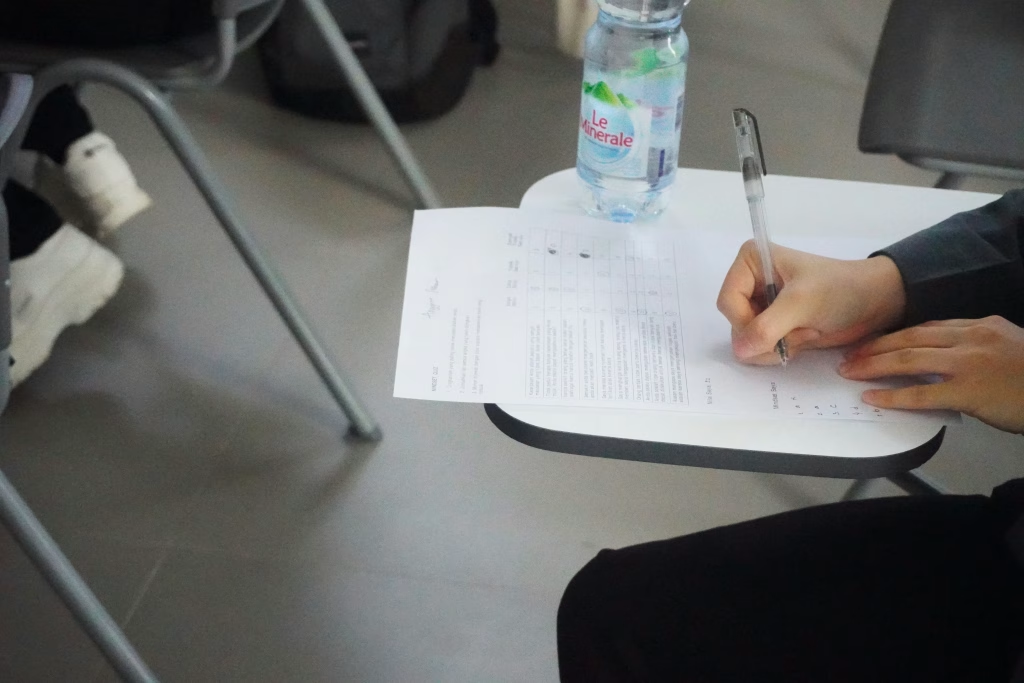The Importance of a Strategic Final Week for DSAT Success
The final week before your DSAT is crucial. This is the time to consolidate your knowledge, sharpen your test-taking strategies, and build confidence for the big day. A well-structured schedule not only ensures you cover all the key content areas but also helps you maintain a balance between studying and self-care. Remember, success on the DSAT isn’t just about cramming information; it’s about mastering the exam format, avoiding careless mistakes, and staying calm under timed conditions. With this day-by-day guide, you’ll be able to identify your weak spots, improve where it matters most, and walk into the test feeling fully prepared. Let’s break down your final week into manageable steps to help you achieve your best performance.
Each day is structured to fit about 6-8 hours of focused study, balanced with breaks to avoid burnout.

Recommended Resources for DSAT Preparation
To maximize your study efforts and familiarize yourself with the DSAT format, it’s essential to use trusted and effective resources. Here are some top recommendations to complement your one-week study schedule:
- Khan Academy Digital SAT Prep
Khan Academy is the official partner of the College Board, providing free and comprehensive DSAT preparation materials. You’ll find practice tests, personalized study plans, and interactive exercises tailored to your skill level. - College Board’s Bluebook App
The Bluebook app is the official testing platform for the DSAT. Use it to take practice tests in the same format as the actual exam. This tool is invaluable for getting accustomed to the digital interface and improving your test-day performance. - OnePrep for DSAT
OnePrep is a powerful resource offering digital SAT-specific practice questions and personalized insights. It’s a great way to target your weaknesses and refine your test-taking strategies efficiently.
Incorporating these resources into your study plan will help you feel more confident and prepared for the DSAT. They provide a mix of guided learning, self-paced practice, and authentic test simulations to ensure you’re ready for any challenge the exam presents.
Summary and Time Commitment
This 1-week study plan covers the most important SAT topics and ensures you have time for practice and review before the test.
Here’s a brief table summarizing the one-week DSAT study schedule:
| Day | Focus | Time Allocation |
|---|---|---|
| Day 1 | Full-Length Practice Test & Review | Test: 3 hrs, Review: 2 hrs, Light Review: 1 hr |
| Day 2 | Strengthen Fundamentals | Math: 2 hrs, Writing: 2 hrs, Reading: 1.5 hrs |
| Day 3 | Timed Section Practice | Math: 1 hr, Writing: 1 hr, Reading: 1.5 hrs |
| Day 4 | Master Test Strategies | Strategies: 1.5 hrs, Reading: 2 hrs, Math: 1 hr |
| Day 5 | Focus on High-Impact Areas | Math: 2 hrs, Grammar: 1.5 hrs, Reading: 2 hrs |
| Day 6 | Simulate Exam Day | Practice Test: 3 hrs, Review: 2 hrs, Light Practice: 1 hr |
| Day 7 | Light Review and Relaxation | Review: 1.5 hrs, Light Practice: 1 hr, Prep: 30 mins |
Day 1: Diagnose Your Strengths and Weaknesses
- Full-Length Practice Test (3 hours)
- Simulate the actual exam with official materials.
- Break (30 minutes)
- Review Results (2 hours)
- Identify weak areas and list topics to focus on.
- Optional Light Review (1 hour)
- Skim key math formulas, grammar rules, or reading strategies.
Day 2: Strengthen Fundamentals
- Math Review (2 hours)
- Focus on problem areas like algebra, geometry, or data analysis.
- Break (30 minutes)
- Writing and Language Review (2 hours)
- Study grammar rules and practice editing passages.
- Lunch Break (1 hour)
- Reading Comprehension Practice (1.5 hours)
- Work on passages with questions about main ideas and details.
- Evening Light Review (1 hour)
- Go over mistakes from the day and summarize what you learned.
Get Top University Tips Twice a Week!
- ECA Breakdown and Step-by-Step Guides
- Internship Program Opportunity
- Dream University Admission: How Top Students made it
- Essay Crafting Secrets with Successful Essays
🔒 This content is exclusive to subscribers. Enter your email to access the full blog and more tips!
We respect your privacy. Unsubscribe at any time.
Day 3: Practice Timed Sections
- Morning Math Section (1 hour)
- Do a timed math section from a practice test.
- Break (15 minutes)
- Morning Review (45 minutes)
- Review mistakes from the math section.
- Writing and Language Section (1 hour)
- Complete a timed writing section.
- Lunch Break (1 hour)
- Afternoon Review (1 hour)
- Analyze grammar mistakes and learn corrections.
- Reading Practice (1.5 hours)
- Complete a timed reading section and review answers.
Day 4: Master Test Strategies
- Pacing and Time Management Drills (1.5 hours)
- Practice answering easy questions first and skipping difficult ones.
- Break (30 minutes)
- Guessing Strategy Practice (1 hour)
- Work on questions where you eliminate wrong answers.
- Lunch Break (1 hour)
- Focused Reading Strategies (2 hours)
- Use active reading methods (e.g., annotation and key idea mapping).
- Evening Light Math Practice (1 hour)
- Practice specific types of problems (e.g., word problems or equations).
Day 5: Focus on High-Impact Areas
- Math Advanced Practice (2 hours)
- Target tough topics like data analysis or functions.
- Break (30 minutes)
- Grammar and Writing Review (1.5 hours)
- Focus on commonly tested rules like verb agreement or modifiers.
- Lunch Break (1 hour)
- Reading Challenge Passages (2 hours)
- Focus on your most challenging passage types (e.g., historical or scientific).
- Evening Quick Review (30 minutes)
- Summarize and reflect on the day’s progress.
Day 6: Simulate Exam Day
- Full-Length Test (3 hours)
- Mimic exam conditions exactly: timing, breaks, etc.
- Break (1 hour)
- Review Test Results (2 hours)
- Focus on the most common mistakes and areas for improvement.
- Light Practice (1 hour)
- Solve problems or questions related to errors from the test.
Day 7: Light Review and Relax
- Morning Review (1.5 hours)
- Go over key formulas, grammar rules, and pacing strategies.
- Break (30 minutes)
- Afternoon Light Practice (1 hour)
- Solve a few questions in weak areas.
- Evening Prep (30 minutes)
- Pack test materials and prepare mentally for the exam.
- Relaxation and Sleep (8+ hours)
- Get to bed early for a fresh start on test day!

Key Notes:
- Breaks: Take a 5–10 minute break every hour to recharge.
- Customization: Adjust timings based on your stamina and strengths.
- Consistency: Stick to the schedule daily to build momentum.
Final Thoughts: Confidence and Preparation Are Key
Preparing for the DSAT in just a week may feel like a daunting task, but with a focused plan and consistent effort, you can make meaningful progress. Stick to this schedule, but remember to adjust it based on your personal strengths and weaknesses. Don’t forget that rest and relaxation are just as important as studying; your brain needs time to process information and recharge. As the exam day approaches, remind yourself that you’ve done your best and trust the effort you’ve put in. No matter the outcome, taking the DSAT is a valuable experience that will prepare you for future challenges. Believe in yourself, stay calm, and give it your all. Good luck—you’ve got this!

If you have any additional questions, feel free to ask in the comment section below, and we will respond promptly. Alternatively, if you encounter any issues during the application process, you can message us on our Facebook page, “Biweekly Abroad“ and we will do our best to assist you. Good luck! 🎉
To get more exciting content about study abroad Subscribe to our newsletter Biweekly Abroad.





